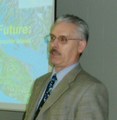Let It Rain Conference

In March 2005 the Douglas College Institute of Urban Ecology in New Westminster, BC hosted a conference on how to keep rainwater out of the pipes and get it back into the ground. Don Moore was the driving force in organizing the event. He was responsible for constructing the first ‘engineered rain garden’ in British Columbia.
Developing Sustainable Solutions for a Liveable Greater Vancouver Region

The Green Infrastructure Partnership informed REAC regarding the Convening for Action process and invited member municipalities to participate in a Consultation Workshop hosted by the City of Surrey in May 2005. “Achieving higher levels of ecological systems protection and overall environmental well-being is being successfully pursued through changes to existing land use regulations, design guidelines and construction standards”, stated Paul Ham.
Learning Events in the Fraser Valley

The BC Ministry of Environment and the federal Department of Fisheries and Oceans held two workshops in 2005 to increase awareness of Species at Risk issues. Kim Stephens was a featured speaker at both events. His presentations were titled “Green Infrastructure & the Water Balance Model: A Tool for Designing with Nature”.
Learning Events in the Thompson and Okanagan

“We are excited to demonstrate that industry is doing its part to rise to the challenge of providing practical solutions to on-the-ground drainage issues,” stated Keith Lumby. The Water Sustainability Action Plan provided context for two learning events that were organized by the EMCO Corporation and held in Kelowna and Kamloops in 2005 during the October/November period.
Real Estate Foundation provides funding for Water Sustainability Committee initiatives

“The mission of the Real Estate Foundation is to support sustainable real estate and land use practices for the benefit of British Columbians,” explained Tim Pringle. “The BCWWA Water Sustainability Committee is a member of an Advisory Committee that has been established by the Foundtion for its Communities in Transition (CIT) initiative. CIT’s mission is to support values-based planning processes that balance social, environmental, economic and governance concerns to address regional and local land use and conservation issues in non-metropolitan areas of BC.”
POLIS Project and Water Sustainability Committee align efforts to advance the “soft path for water”

“The POLIS Project on Ecological Governance is an ecology-based public policy think tank situated at the University of Victoria. The mission of POLIS is to help reorient Canadian water management from supply to demand-side approaches,” explained Oliver Brandes. “A ‘soft path’ for water takes the management approach beyond traditional concerns to consider how we might redesign the underlying human systems that determine demand and our approach to supply.”
Nature’s Revenue Streams Links Rainwater Infrastructure to Restoration of Stream and Watershed Function

“Nature’s Revenue Streams is a 3-year public-private project on Vancouver Island that will show how urban development can be used as an opportunity to improve watershed and stream health,” stated Patrick Lucey. “NRS has considerable synergy and commonality with elements of the Water Sustainability Action Plan, both in terms of approach and green infrastructure deliverables. For this reason, NRS has executed Statements of Collaboration with the Water Sustainability Committee, the Green Infrastructure Partnership, and the Water Balance Model) Partnership.”
As Climate Change Challenges Local Water Resources, New Guide Advocates the ‘Soft Path’ to Water Security

“New approaches for water security are needed right now,” says Dr. David Brooks. “You could learn to live without oil, and we should, but you will not survive without fresh water. Climate chaos will force us to re-think how we manage our voracious demand for energy and water. We offer the Soft Path as a way to do that—a way that respects the environment and leads to social prosperity.”
POLIS Project on Ecological Governance has released At a Watershed: Ecological Governance and Sustainable Water Management in Canada

“This report builds on the strength of the action plans laid out in previous reports. At a Watershed goes beyond the urban environment, addressing specific issues of governance. This final instalment creates the holistic solution for long-term water sustainability in Canada,” states Oliver Brandes.
City of Quesnel hosted pilot workshop on “Big Ideas for Small Communities” in October 2004

“The Quesnel workshop provided a timely opportunity to test the relevance of the ‘water balance messaging’ in a Smalltown BC context. The discussion confirmed that small communities recognize the need for changes in land development practices,” reported Kim Stephens.

